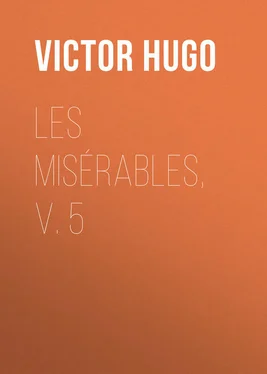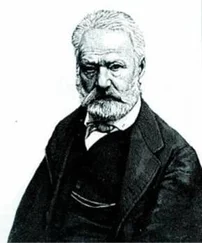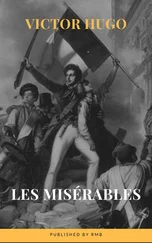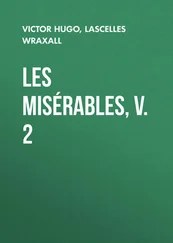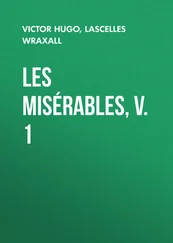Victor Hugo - Les Misérables, v. 5
Здесь есть возможность читать онлайн «Victor Hugo - Les Misérables, v. 5» — ознакомительный отрывок электронной книги совершенно бесплатно, а после прочтения отрывка купить полную версию. В некоторых случаях можно слушать аудио, скачать через торрент в формате fb2 и присутствует краткое содержание. Жанр: literature_19, foreign_antique, foreign_prose, на английском языке. Описание произведения, (предисловие) а так же отзывы посетителей доступны на портале библиотеки ЛибКат.
- Название:Les Misérables, v. 5
- Автор:
- Жанр:
- Год:неизвестен
- ISBN:нет данных
- Рейтинг книги:3 / 5. Голосов: 1
-
Избранное:Добавить в избранное
- Отзывы:
-
Ваша оценка:
- 60
- 1
- 2
- 3
- 4
- 5
Les Misérables, v. 5: краткое содержание, описание и аннотация
Предлагаем к чтению аннотацию, описание, краткое содержание или предисловие (зависит от того, что написал сам автор книги «Les Misérables, v. 5»). Если вы не нашли необходимую информацию о книге — напишите в комментариях, мы постараемся отыскать её.
Les Misérables, v. 5 — читать онлайн ознакомительный отрывок
Ниже представлен текст книги, разбитый по страницам. Система сохранения места последней прочитанной страницы, позволяет с удобством читать онлайн бесплатно книгу «Les Misérables, v. 5», без необходимости каждый раз заново искать на чём Вы остановились. Поставьте закладку, и сможете в любой момент перейти на страницу, на которой закончили чтение.
Интервал:
Закладка:
He commanded men as resolute as himself. "Mad-men," a witness called them. His company, the same which had shot Jean Prouvaire, was the first of the battalion posted at the street corner. At the moment when it was least expected the captain dashed his men at the barricade; but this movement, executed with more good-will than strategy, cost Fannicot's company dearly. Before it had covered two thirds of the street a general discharge from the barricade greeted it; four, the boldest men of all, running at the head, were shot down in point-blank range at the very foot of the barricade, and this courageous mob of National Guards, very brave men, but not possessing the military tenacity, was compelled to fall back after a few moments, leaving fifteen corpses in the street. The momentary hesitation gave the insurgents time to reload, and a second and most deadly discharge assailed the company before the men were able to regain their shelter at the corner of the street. In a moment they were caught between two fires, and received the volley from the cannon, which, having no orders to the contrary, did not cease firing. The intrepid and imprudent Fannicot was one of those killed by this round of grape-shot; he was laid low by the cannon. This attack, which was more furious than serious, irritated Enjolras.
"The asses!" he said, "they have their men killed and expend our ammunition for nothing."
Enjolras spoke like the true general of the riot that he was: insurrection and repression do not fight with equal arms; for the insurrection, which can be soon exhausted, has only a certain number of rounds to fire and of combatants to expend. An expended cartouche-box and a killed man cannot have their place filled up. Repression, on the other hand, having the army, does not count men, and having Vincennes, does not count rounds. Repression has as many regiments as the barricade has men, and as many arsenals as the barricade has cartouche-boxes. Hence these are always contests of one man against a hundred, which ever end by the destruction of the barricade, unless revolution, suddenly dashing up, casts into the balance its flashing archangel's glaive. Such things happen, and then everything rises, paving-stones get into a state of ebullition, and popular redoubts swarm. Paris has a sovereign tremor, the quid divinum is evolved; there is an August 10 or a July 29 in the air, a prodigious light appears, the yawning throat of force recoils, and the army, that lion, sees before it, standing erect and tranquil, that prophet, France.
CHAPTER XIII
GLEAMS WHICH FADE
In the chaos of feelings and passions which defend a barricade there is everything, – bravery, youth, the point of honor, enthusiasm, the ideal, conviction, the obstinacy of the gambler, and above all intermitting gleams of hope. One of these intermittences, one of these vague quiverings of hope, suddenly ran along the Chanvrerie barricade at the most unexpected moment.
"Listen," Enjolras, who was ever on the watch, exclaimed. "I fancy that Paris is waking up."
It is certain that on the morning of June 6 the insurrection had for an hour or two a certain reanimation. The obstinacy of the tocsin of St. Merry aroused a few slight desires, and barricades were begun in the Rue du Poirier and in the Rue des Gravilliers. In front of the Porte St. Martin, a young man armed with a gun attacked a squadron of cavalry alone, unprotected, and on the open boulevard he knelt down, raised his gun, fired and killed the Major, and then turned away, saying, "There's another who will do us no more mischief." He was cut down. In the Rue St. Denis a woman fired at the National Guard from behind a Venetian shutter, and the wooden laths could be seen to tremble every moment. A boy of fourteen was arrested in the Rue de la Cossonnerie with his pockets full of cartridges, and several guard-houses were attacked. At the entrance of the Rue Bertin Poirée a very sharp and quite unexpected fusillade greeted a regiment of cuirassiers, at the head of which rode General Cavaignac de Barague. In the Rue Planche Mibray old crockery and household utensils were thrown from the roofs down on the troops; this was a bad sign, and when Marshal Soult was informed of the fact, Napoleon's old lieutenant became pensive, for he remembered Suchet's remark at Saragossa: "We are lost when old women empty their pots de chambre on our heads." These general symptoms manifested at a moment when the riots were supposed to be localized, this fever of anger which regained the upper hand, these will-o'-the-wisps flying here and there over the profound masses of combustible matter which are called the faubourgs of Paris, and all the accompanying facts, rendered the chiefs anxious, and they hastened to extinguish the beginnings of the conflagration. Until these sparks were quenched, the attacks on the barricades Maubuée, de la Chanvrerie, and St. Merry were deferred, so that all might be finished at one blow. Columns of troops were sent through the streets in a state of fermentation, clearing the large streets and searching the smaller ones, on the right and on the left, at one moment slowly and cautiously, at another at quick march. The troops broke open the doors of the houses whence firing was heard, and at the same time cavalry manœuvres dispersed the groups on the boulevards. This repression was not effected without turmoil, and that tumultuous noise peculiar to collisions between the army and the people, and it was this that had attracted Enjolras's attention in the intervals between the cannonading and the platoon fire. Moreover, he had seen wounded men carried along the end of the street on litters, and said to Courfeyrac, "Those wounded are not our handiwork."
The hope lasted but a short time, and the gleam was quickly eclipsed. In less than half an hour what there was in the air vanished; it was like a flash of lightning without thunder, and the insurgents felt that leaden pall, which the indifference of the people casts upon abandoned obstinate men, fall upon them again. The general movement, which seemed to have been obscurely designed, failed, and the attention of the Minister of War and the strategy of the generals could now be concentrated on the three or four barricades that remained standing. The sun rose on the horizon, and an insurgent addressed Enjolras, —
"We are hungry here. Are we really going to die like this, without eating?"
Enjolras, still leaning at his parapet, made a nod of affirmation, without taking his eyes off the end of the street.
CHAPTER XIV
IN WHICH WE READ THE NAME OF THE MISTRESS OF ENJOLRAS
Courfeyrac, seated on a stone by the side of Enjolras, continued to insult the cannon, and each time that the gloomy shower of projectiles which is called a grape-shot passed with its monstrous noise he greeted it with an ironical remark.
"You are wasting your breath, my poor old brute, and I feel sorry for you, as your row is thrown away. That is not thunder, but a cough."
And those around him laughed Courfeyrac and Bossuet, whose valiant good-humor increased with danger, made up for the want of food, like Madame Scarron, by jests, and as wine was short, poured out gayety for all.
"I admire Enjolras," said Bossuet. "His temerity astonishes me. He lives alone, which, perhaps, renders him a little sad; and Enjolras is to be pitied for his greatness, which attaches him to widowhood. We fellows have all, more or less, mistresses, who make us mad, that is to say brave, and when a man is as full of love as a tiger the least he can do is to fight like a lion. That is a way of avenging ourselves for the tricks which our grisettes play us. Roland lets himself be killed to vex Angelique, and all our heroism comes from our women. A man without a woman is like a pistol without a hammer, and it is the woman who makes the man go off. Well, Enjolras has no woman, he is not in love, and finds means to be intrepid. It is extraordinary that a man can be cold as ice and daring as fire."
Читать дальшеИнтервал:
Закладка:
Похожие книги на «Les Misérables, v. 5»
Представляем Вашему вниманию похожие книги на «Les Misérables, v. 5» списком для выбора. Мы отобрали схожую по названию и смыслу литературу в надежде предоставить читателям больше вариантов отыскать новые, интересные, ещё непрочитанные произведения.
Обсуждение, отзывы о книге «Les Misérables, v. 5» и просто собственные мнения читателей. Оставьте ваши комментарии, напишите, что Вы думаете о произведении, его смысле или главных героях. Укажите что конкретно понравилось, а что нет, и почему Вы так считаете.
